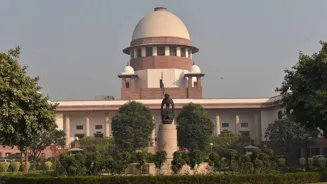What is the story about?
The Supreme Court has said that online shows run by social media influencers do not enjoy the protection and guarantees provided by free speech, asking five content creators to issue public apologies for "ridiculing" persons with disabilities.
A bench of Justices Surya Kant and Joymalya Bagchi said the degree of repentance should be higher than the degree of offending and made it clear that the court would consider imposing a penalty on the influencers for offending disabled persons through social media influencers, at a later stage.
The bench noted, "Influencers commercialise speech. When a speech falls in the ambit of commercial or prohibitive categories, the immunity under right to free speech is not available."
The case, which began with podcaster Ranveer Allahbadia’s vulgar remarks, has since expanded to include five others: Samay Raina, Vipul Goyal, Balraj Paramjeet Singh Ghai, Sonali Thakur, and Nishant Jagdish Tanwar.
Attorney General R. Venkataramani stated that he has consulted with stakeholders, including the Ministry of Information and Broadcasting, to develop guidelines for online speech. However, he emphasised that the matter requires careful handling due to its implications for free speech.
Venkataramani said the government was in the process of formulating the guidelines, but ruled out any "gag order".
Justice Kant agreed and said that was the reason behind the suggestion in the last hearing that draft guidelines will be shared in the public domain for the views of all stakeholders.
"There should be some accountability. Today it is disabled people, but tomorrow it can be women, children and senior citizens," Justice Kant added.
Justice Bagchi weighed in, "Humour is definitely well taken as humour is a part of life. We laugh at ourselves, but when you start laughing at others, then we should have a sense of sensibility. It's not only disability, but we are a country of varied communities…" He further told Venkataramani that the proposed guidelines should sensitise the people and fix responsibility for their faults."
NGO Cure SMA Foundation of India sought action against the five influencers over their utterances on the disabled. Senior advocate Aprajita Singh, appearing for the NGO, said a better sense prevailed among the influencers, who tendered an unconditional apology.
She said the issue was not of the influencers alone and the Information Technology Rules and the Cinematograph Act mandate that persons with disabilities cannot be targeted.
With inputs from agencies
A bench of Justices Surya Kant and Joymalya Bagchi said the degree of repentance should be higher than the degree of offending and made it clear that the court would consider imposing a penalty on the influencers for offending disabled persons through social media influencers, at a later stage.
The bench noted, "Influencers commercialise speech. When a speech falls in the ambit of commercial or prohibitive categories, the immunity under right to free speech is not available."
The case, which began with podcaster Ranveer Allahbadia’s vulgar remarks, has since expanded to include five others: Samay Raina, Vipul Goyal, Balraj Paramjeet Singh Ghai, Sonali Thakur, and Nishant Jagdish Tanwar.
SC orders ministry to form guidelines
Attorney General R. Venkataramani stated that he has consulted with stakeholders, including the Ministry of Information and Broadcasting, to develop guidelines for online speech. However, he emphasised that the matter requires careful handling due to its implications for free speech.
Venkataramani said the government was in the process of formulating the guidelines, but ruled out any "gag order".
Justice Kant agreed and said that was the reason behind the suggestion in the last hearing that draft guidelines will be shared in the public domain for the views of all stakeholders.
"There should be some accountability. Today it is disabled people, but tomorrow it can be women, children and senior citizens," Justice Kant added.
Justice Bagchi weighed in, "Humour is definitely well taken as humour is a part of life. We laugh at ourselves, but when you start laughing at others, then we should have a sense of sensibility. It's not only disability, but we are a country of varied communities…" He further told Venkataramani that the proposed guidelines should sensitise the people and fix responsibility for their faults."
Who filed the case?
NGO Cure SMA Foundation of India sought action against the five influencers over their utterances on the disabled. Senior advocate Aprajita Singh, appearing for the NGO, said a better sense prevailed among the influencers, who tendered an unconditional apology.
She said the issue was not of the influencers alone and the Information Technology Rules and the Cinematograph Act mandate that persons with disabilities cannot be targeted.
With inputs from agencies




















